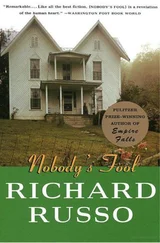Okay, sure, there’d been some shitty luck involved. Bath’s mineral springs had mysteriously dried up over a century ago while Schuyler’s continued to percolate up enthusiastically from its shale. Schuyler also had a famous thoroughbred racetrack, an acclaimed writers’ retreat and a center for the performing arts, a high-toned liberal arts college (Bath had only a beleaguered two-year community college), as well as a dozen fancy restaurants that served exotic foods like ramps, whatever they were. On the restaurant front, all Bath could boast was its rundown roadhouse tavern, the White Horse, Hattie’s Lunch, a donut shop and a new Applebee’s out by the freeway exit. What all this amounted to, everyone agreed, was a complete economic and cultural rout. For a while the fun park had gotten people’s hopes up, but when they were dashed the collective despair was so profound that the town had even stopped stringing the buoyantly optimistic Main Street banners that had become its dubious trademark, the last of which had read: THINGS ARE LOOKING  IN BATH. The gloom had lasted until Gus Moynihan, a retired college professor who was renovating one of the grand old Victorians on Upper Main Street, wrote a guest newspaper editorial decrying the town’s mordant defeatism and criticizing the current Republican administration’s unspoken policies, which could be summed up, he claimed, in nine words: No Spending. None. Ever. On Anything. Under Any Circumstances . Why not string one last banner across the street, he suggested: LET’S EAT DIRT.
IN BATH. The gloom had lasted until Gus Moynihan, a retired college professor who was renovating one of the grand old Victorians on Upper Main Street, wrote a guest newspaper editorial decrying the town’s mordant defeatism and criticizing the current Republican administration’s unspoken policies, which could be summed up, he claimed, in nine words: No Spending. None. Ever. On Anything. Under Any Circumstances . Why not string one last banner across the street, he suggested: LET’S EAT DIRT.
The editorial had struck a chord and made a mayoral candidate of its author. Even his opponents had to admit that Gus and his cronies, many of them “from away,” had run a clever campaign. Let’s BE Schuyler Springs was the gist of it. Instead of competing with their obnoxious neighbor, why not take advantage of its proximity? Half the people who came to the racetrack and performing arts center in the summer had no place to stay and ended up in hotels as far away as Schenectady. Why shouldn’t they stay in Bath? Okay, the Sans Souci Hotel and Resort with its nearly three hundred rooms had run into legal difficulties fueled by local resentment when it became known that the new owners would be using downstate contractors and labor for almost everything. The old hotel’s lavish renovations had cost far more and taken much longer than expected, causing it to miss much of the summer-tourist trade that first season, and the locals had steadfastly rebelled against the prices at its fancy restaurant.
But that didn’t mean its basic concept was flawed, or so the Moynihan crowd had argued. Instead of throwing up roadblocks to entrepreneurship, the town should have offered tax breaks and other incentives. Same deal with restaurants. During the short summer season, desperate, hungry travelers even mobbed the Horse, so why not entice a young chef or two up from New York City. Find out what the hell ramps were and serve them, if that’s what people really craved. It wasn’t like Schuyler Springs had cornered the world ramps market and refused to share. Overnight, the new byword was “partnering.” Whenever possible, Bath would partner not only with odious Schuyler Springs and moneyed downstaters but also with local entrepreneurs in projects of exceptional merit.
One of these locals was Carl Roebuck, who most people were surprised to learn was an entrepreneur, having known him all their lives as a con man and an asshole. Carl’s father, Kenny, they’d liked. He’d built Tip Top Construction from nothing by working fourteen-hour days. Like so many men of his generation, he hoped his son wouldn’t have to work quite so hard. On that score he had no legitimate worries. In college Carl learned to drink and seduce women and spend his father’s money and loathe all things Carhartt, especially the brand’s connotations of hard, honest labor. Returning home, he gave no indication that he meant to work at all if he could help it.
After his father’s unexpected death, he couldn’t help it, but he was lazy and did shoddy work and nearly lost the company when the Ultimate Escape Fun Park went belly-up. He hadn’t been directly involved in that doomed venture, but he’d gotten wind of it early and purchased for virtually nothing a tract of adjacent land he figured would eventually be needed for parking. There, using federal dollars, he set about erecting a dozen low-income housing units and awaited the groundbreaking of the fun park, after which he intended to sell the parcel, improvements and all, at extortionary profit. But then, at the eleventh hour, financing for the park had fallen through, and Carl, who’d seen no reason to build his units to code, thinking nobody’d ever live in them, had been stranded with a dozen substandard duplexes whose brand-new roofs already leaked, whose porous basements sucked sulfurous moisture from the nearby wetlands every time it rained and whose moldy walls sported earthquake-sized fissures. It had taken most of the last decade to extricate Tip Top Construction from the resulting quagmire of litigation. To save it, Carl had to sell his house and half the heavy-construction equipment on his lot — the half, he privately lamented, that still worked. He hadn’t minded losing the house because at the time his wife, Toby, was divorcing him and would have ended up with it anyway, but still. It had been a decade of painful misfortune from which Carl had learned, as far as anyone could tell, exactly nothing.
His current project, snakebit from the start, was the conversion of the long-abandoned shoe factory on Limerock Street. The concept of the Old Mill Lofts was so dumb — or so the conventional wisdom had it — that it took your breath away. Ever since it was announced, people had been writing in to the North Bath Weekly Journal pretty much nonstop, decrying its abject lunacy and its complete and utter waste of taxpayer (“partnered”) dollars. Even assuming you could accomplish the planned renovations — a point no one conceded — and could also drive out the army of rats that reportedly had taken up residence in the building’s nether regions, and then could fix the roof that’d been leaking for forty years, who in Bath could afford to live there? The cheapest units on the ground floor were supposed to start at around a quarter of a million dollars, the larger units on the top floor going for three times that. Those were Schuyler prices.
But according to Mayor Moynihan, who himself had a down payment on one of the units, the high price tag was precisely the point. The Old Mill Lofts signaled that Bath was back in the game, a town with much to offer. Sure, the project was ambitious, the new administration conceded, but it was hardly unprecedented. Decrepit, abandoned factories were being converted into living and retail spaces all over the country. In fact lofts, like ramps, were all the rage. Better yet, Schuyler Springs, which had never engaged in anything as grubby as manufacturing, had no decrepit old mills to retrofit, so in this respect Bath had a clear advantage. (Yes, the habit of invidious comparison was hard to surrender.)
The real problem with the Old Mill Lofts, according to others, wasn’t so much the concept as Carl Roebuck himself. The units were being billed as upscale urban-style dwellings, but woven deeply into his character and experience was the desire to do things on the cheap and pocket the difference. Old-guard pessimists grumbled that the town wasn’t so much partnering for tomorrow with a gifted entrepreneur as fronting for yesterday’s known swindler. Some even wondered if Carl might be up to his old tricks, having purchased something seemingly worthless on insider information in hopes of flipping it when its true value became apparent. Maybe the work being done on the mill was just for show. Carl, who was widely rumored to be distracted by health problems, was seldom at the mill when important decisions needed to be made, and when he happened to be on hand, he didn’t seem to care much whether they zigged or zagged. Even those who gave him the benefit of the doubt when it came to his motives still worried that Tip Top Construction, impaired by relentless court judgments and harsh penalties, simply lacked the working capital necessary for a project of this scope. What was left of Carl’s heavy machinery sat rusting out at the yard, fritzed beyond repair. At present he employed only a dozen workers and kept most of them under forty hours a week so he wouldn’t have to pay benefits. Every week rumors circulated that this would be the one where he failed to make payroll.
Читать дальше

 IN BATH. The gloom had lasted until Gus Moynihan, a retired college professor who was renovating one of the grand old Victorians on Upper Main Street, wrote a guest newspaper editorial decrying the town’s mordant defeatism and criticizing the current Republican administration’s unspoken policies, which could be summed up, he claimed, in nine words: No Spending. None. Ever. On Anything. Under Any Circumstances . Why not string one last banner across the street, he suggested: LET’S EAT DIRT.
IN BATH. The gloom had lasted until Gus Moynihan, a retired college professor who was renovating one of the grand old Victorians on Upper Main Street, wrote a guest newspaper editorial decrying the town’s mordant defeatism and criticizing the current Republican administration’s unspoken policies, which could be summed up, he claimed, in nine words: No Spending. None. Ever. On Anything. Under Any Circumstances . Why not string one last banner across the street, he suggested: LET’S EAT DIRT.










